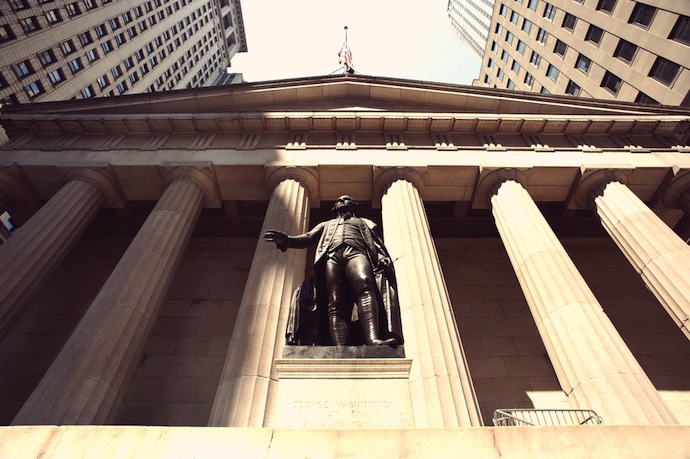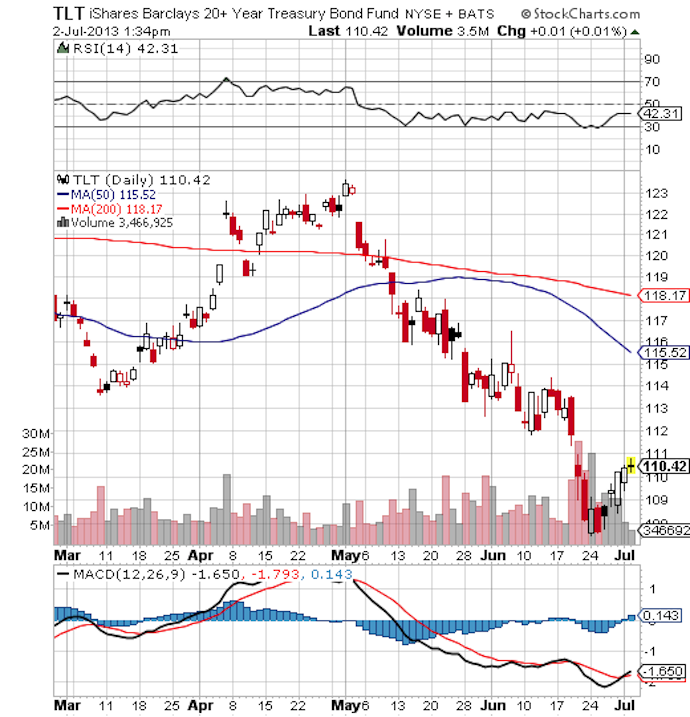Bond Kings Predict Decline Is Over
Bonds prices, and consequently bond funds, have taken a hit over the past month, while bond yields have spiked upward. Some market commentators have called a bubble in the bond market that has finally popped. Investors have lost confidence to some extent, and withdrew a massive $23.3 billion from bond funds in the week ending June 26th. It appears that most of the downward movement in the bond market can be linked to statements that the Federal Reserve would begin tapering its quantitative easing measures by reducing the amount of treasuries it is buying. The Fed is currently making about $85 billion in monthly Treasury purchases. Still, famed bond investors such as Bill Gross and Jeff Gundlach have indicated that the bond sell-off is over, and bonds will rise once again.
https://twitter.com/PIMCO/status/350649368321327104
The market took an initial dim view of the news from the Fed, but now that expectation may be priced into the market. Bond prices have recovered some of its recent losses in the past few trading days. The question for investors is whether this is a temporary stabilization in the bond market, or whether there is a danger of a further downward pressure.
The current yield on the 10 Year Treasury Note is 2.49%, up around 88 basis points since early May, and even recently broke through the 2.5% “line in the sand” drawn by some bond experts. The I-shares Barclay’s 20+ Year Treasury Fund (NYSE: TLT) is down 10.45% year to date, but has recovered 1.67% in the last week. The PIMCO Total Return Bond ETF (NYSE: BOND) has also been hit, losing 2.21% in June, but up 2.9% on the year. June’s monthly loss is the largest since the inception of the ETF in February 2012.
Bill Gross is the head of PIMCO, with approximately $285 billion under management. Gross said in a recent note to investors that the recent bond decline was overdone, because the economy is currently too weak to sustain higher borrowing costs. He said the downturn was a result of the de-leveraging of risk by the market. Gross stated that the Fed’s economic forecast was too optimistic, and failed to consider the recent spike in mortgage rates which would increase borrowing costs for home buyers. He advised that bond investors not jump ship now, but rather stay the course. Still, he indicated that the previous performance in the run up in the bond and equities market over the past 20 years would likely not be replicated moving forward. Gross also predicted that the 10-year Treasury should be in the range of 2.10%, rather than the current level.
Jeff Gundlach, the CEO and founder of Doubline Capital, is another prominent bond investors who is renowned for having made some very accurate market predictions over the years. However, his crystal ball has not been so clear lately, as he had previously declared that the 2.5% yield on the 10-year Treasury would not be breached. He held a webcast last week to try and explain the current bond market uncertainty.
Gundlach blamed the recent downturn on a liquidation cycle. He hypothesized that the liquidation was initiated by a few key players taking leveraged risk off the table, which then led to other leveraged market participants getting margin calls. His presentation included a number of slides, highlighting the rapid decline in gold, the overall bearish trend in commodities, and the recent spike in the China Inter-bank Offering Rate, among others. Gundlach further predicted the 10 year yield would fall to 1.7% by the end of the year.
Despite the protestations of the bond kings, other prominent financial minds are still bearish on bonds. The Oracle of Omaha, Warren Buffett, recently called the current bond market a terrible investment, and stated that investors could lose a lot of money as interest rates rise. He further stated the treasury market was artificially inflated due to the Fed’s quantitative easing. Thus, there are differing views on the future of the bond market. It remains to be Gundlach and Gross have successfully called the bottom in the bond market remains to be seen, as yields have declined marginally in the past few days, or whether another downturn for bonds is in store.









































